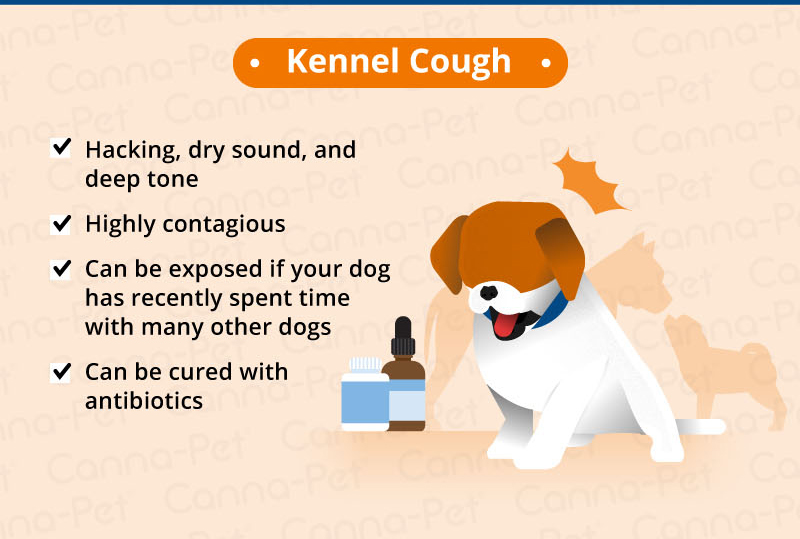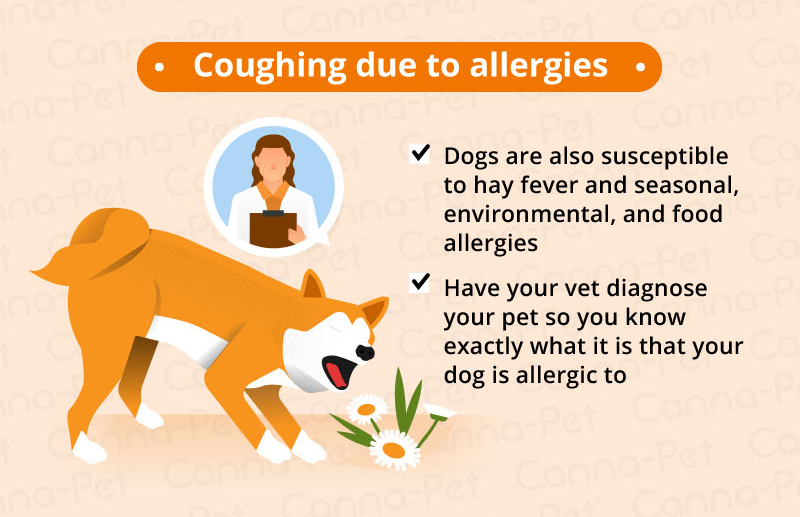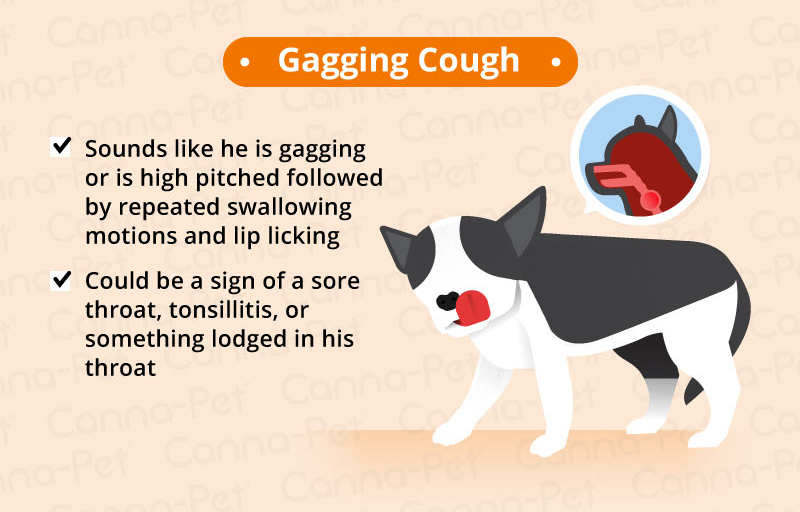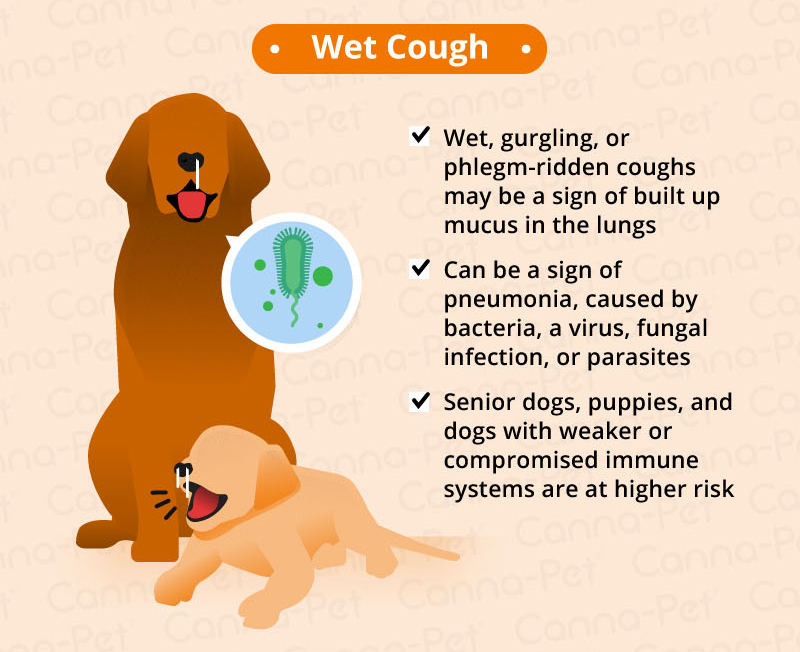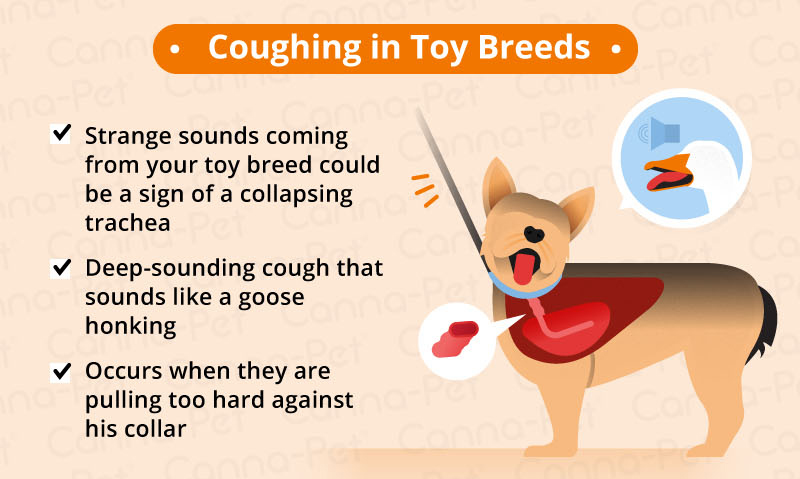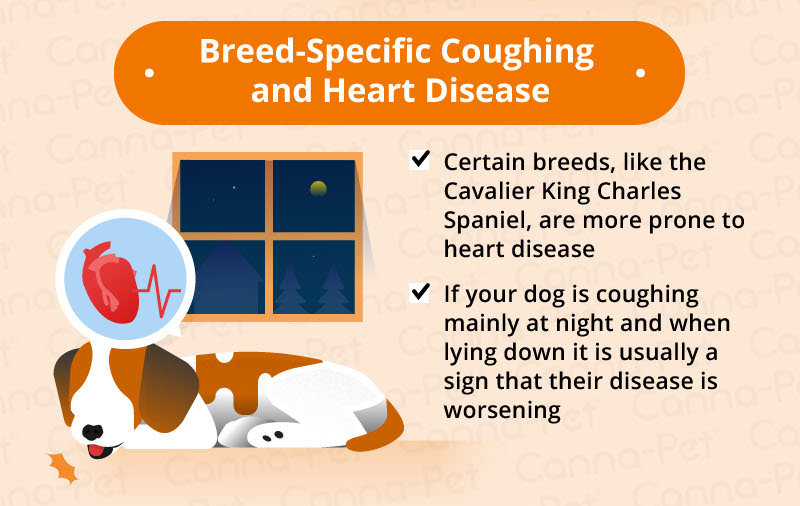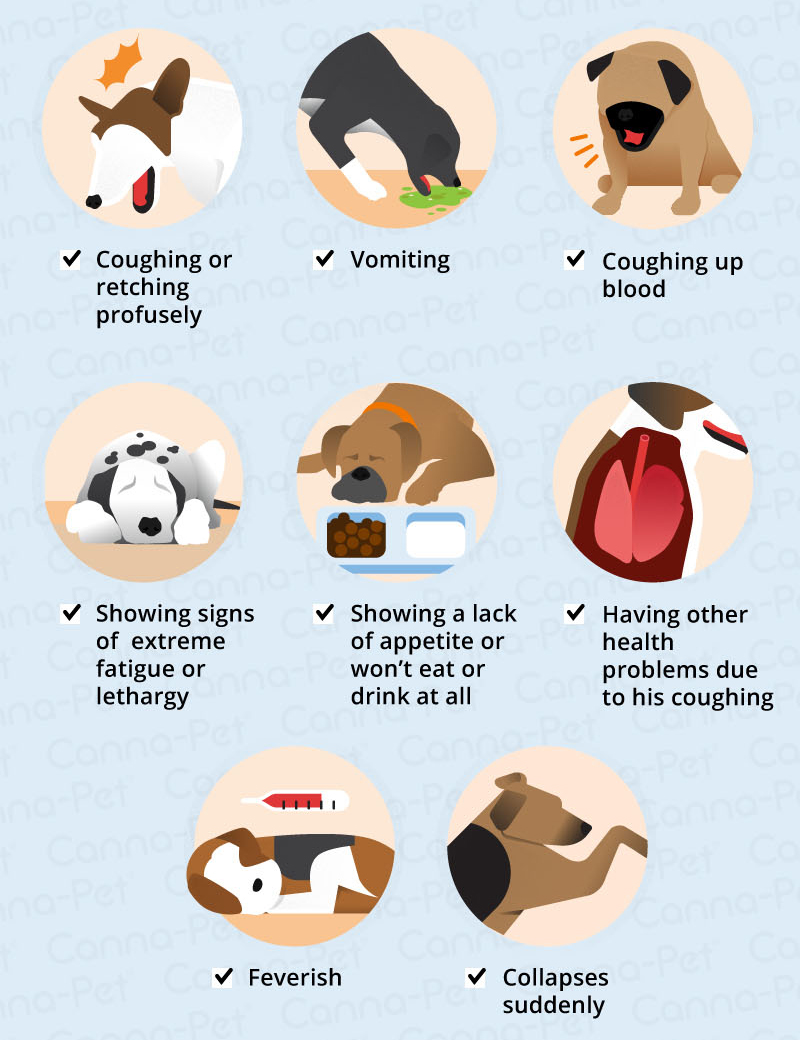For most pet owners, there are times of uncertainty when it comes to their dog’s health. For example, when people find themselves coughing, it’s usually indicative of a few different conditions – we may be fighting or cold or merely clearing our throats. In some instances, it may signify something more serious, such as a bronchial infection or even lung disease.
Similarly, in the case of our four-legged friends, a cough in your dog may indicate a variety of different health issues. In this article, we’ll explore the various types of coughs to be aware of and what they sound like in order to provide proper care to your pooch.
Types of Canine Coughs: Recognizing The Signs & Causes
When you notice your dog is coughing, it’s important to pay attention to the signs, symptoms and even sounds he’s making. There are many factors that can be taken into account – such as his overall health, environmental circumstances, and even breed – when determining the cause of his cough. Below, we’ve identified a few of the primary types of canine cough symptoms and why your dog is suffering:
Kennel Cough: Recognized by its hacking, dry sound and deep tone, kennel cough (also known as canine cough) usually gets worse the longer your pup’s been struggling with the illness. This infection is highly contagious and is either bacterial or viral in origin. If your hound has recently been boarded in a kennel, been in contact with a large number of dogs at the park, at the groomer’s, in obedience class, or in similar social circumstances, he may have been exposed to the infection.
Coughing Due to Allergies: Similar to human allergies, our four-legged friends are also susceptible to hay fever and seasonal, environmental, and even food allergies. If you believe your dog is displaying signs of allergies (such as watery eyes, coughing, sneezing and itching) it’s important to have your vet diagnose him to rule out any and all potential causes of irritation, particularly food-related triggers.
Gagging Cough: In the case where you notice your dog’s cough sounds like he is gagging or high-pitched, accompanied by repeated swallowing motions and lip-licking, he may have a sore throat. Your vet will be able to determine if he’s merely suffering from a sore throat or has tonsillitis; he may also have something lodged in his throat. Therefore, the causes for a gagging cough in dogs can vary.
Wet Cough: if your dog’s cough sounds wet, gargling or phlegm-ridden, it may indicate a build-up of mucus in the lungs. Typically a sign of pneumonia, this illness is caused by either bacteria, a virus, a fungal infection, or parasites. Dogs who are highest risk include senior dogs, puppies or those with a weak or compromised immune system. It should be noted that your furry friend can also develop pneumonia if he accidentally inhales a foreign object.
Coughing in Toy Breeds: In the instance of strange sounds coming from your toy breed, it may be indicative of a condition known as collapsing trachea. Marked by a deep-sounding cough that resembles a goose honking, it usually occurs when your pooch is pulling too hard against his collar.
Breed-Specific Coughing & Heart Disease: Certain breeds are more prone to heart disease, such as the Cavalier King Charles Spaniel. If you notice your dog is coughing mainly at night or when lying down, it often is a sign that the condition is worsening.
Treating Your Dog’s Cough: What to Expect
Being diligent as a pet owner includes recognizing the different signs and symptoms outlined above, and the next step would be to bring your dog to a trusted veterinarian for a complete physical. In most cases, each of these types of coughs and the conditions they’re indicative of can be treated if caught early on, particularly if your dog is coughing violently or persistently and is displaying other signs of fatigue or distress.
Once your vet has determined the cause of illness, he will treat him accordingly. For dogs suffering from kennel cough, a course of antibiotics will be prescribed and your pooch should be isolated from other dogs so he doesn’t spread this contagious infection. You can help ease his discomfort by doing the same things that help people when they’re congested, such as bringing him in the bathroom during a hot shower so he can inhale the steam; you may also wish to run a humidifier to increase the moisture in your home’s atmosphere.
If you think your dog may have accidentally swallowed or inhaled something, such as a grass seed, acorn, or other foreign object, it’s important to act quickly. If your dog plays outside, especially in the park or in wooded or grassy areas, keep a vigilant eye on him to avoid such instances whenever possible. If he doesn’t immediately cough up what seems to be something stuck in his throat, it’s important to bring him to a vet immediately to avoid choking or asphyxiation, but also to ensure whatever is lodged in his throat doesn’t lead to a bacterial infection or worse, a case of pneumonia. Your vet will be able to determine the cause and remove the foreign body if that is the case.
For dogs who are diagnosed with a sore throat, pneumonia, or tonsillitis, your vet will usually treat your pup with antibiotics to clear up his symptoms. Unlike humans, though, your pooch won’t require a tonsillectomy if he happens to have tonsillitis. If you believe your dog is an allergy sufferer, your vet may prescribe medication or a specially-formulated diet or supplements to ensure his health.
Although not quite as serious as some of the other cough-related ailments on our list, tracheal collapse is still something you should watch for in aging toy breed dogs. Most frequently seen in older dogs, this condition is the result of aggressive behavior on your pooch’s behalf, and is typically due to being both overweight and very excitable.
For example, if your toy happens to see another (usually larger) dog, he may strain and pull on his leash, and put undue pressure on his throat. Besides watching his weight and training him not to pull on the leash, you may also want to avoid confrontational activities that may set him off. Providing him with moderate exercise, considering dietary supplements to support his health, and feeding him specially-formulated dog food to regulate his weight can also be very helpful in protecting your dog against this condition.
Because coughing is one of the signs associated with congestive heart failure, it’s critical to take your dog to the vet if you suspect his health is in danger, particularly if his breed is prone to heart disease or his cough is accompanied by labored or rapid breathing/panting, bloody discharge, or he collapses. In instances where your dog’s condition is severe, your vet may recommend seeing a veterinary cardiologist or internal medicine specialist. If caught early on, your dog’s condition and quality of life may be manageable with certain prescription medications.
In addition to the canine coughing conditions outlined above, there are a number of other possible causes, including heartworm disease, distemper, canine influenza, chronic bronchitis and certain types of cancer. For dogs who are diagnosed with fungal infections (transmitted via dirt or through the air in the form of fungus or yeast), your dog’s physician may prescribe medications to treat your pup.
For canine diseases such as heartworms and distemper, a vaccination should be administered by your vet to protect your dog against these dangerous illnesses. Although the occasional cough isn’t anything to stress out over, if you notice a persistent cough along with any of the aforementioned symptoms, be sure to bring your four-legged friend to the vet immediately for a professional medical evaluation.
My Dog Keeps Coughing: When to Bring Him to The Vet
Just like their human counterparts, it’s normal for your dog to cough or sneeze on occasion – inhaling dust, debris, and germs can affect his respiratory functions. And just like people, dogs can get viruses and infections, too. However, if your dog is coughing excessively or seems unable to stop, he may require a visit to the vet for an examination and treatment.
If your dog shows any of the following symptoms, it is wise to take him to the vet:
- His cough has lasted more than a week or has gotten progressively worse
- He is coughing or retching profusely
- He is vomiting
- He is coughing up blood
- He shows signs of extreme fatigue or lethargy
- He shows a lack of appetite or won’t eat/drink at all
- He has a fever
- He has other health problems (due to either other accompanying symptoms or preexisting conditions)
- He collapses suddenly
In most instances, your veterinarian may ask the following questions, such as:
- Is your dog having difficulty breathing between coughing fits?
- When does your dog tend to cough – at night, after eating/drinking, after he’s going for a walk or engaging in physical activity, or when he’s excited?
- What does your dog’s cough sound like (describe in detail)
- Does the cough sound dry and hoarse or wet and moist?
- When he coughs, does it sound like he’s going to vomit?
- Where has your dog visited lately (for example, in a place with other dogs, on a family trip, or in a smoking environment)?
- Has there been any significant changes to your pup’s daily routine?
- Is your dog up-to-date on his annual shots and heartworm prevention routine?
- When was the last time he took his medication (if he’s on anything)?
Once your vet has carefully and thoroughly examined your dog, he’ll run a series of tests to determine the source and cause of his illness, which may range from allergies and viruses to underlying health conditions. Your dog’s treatment will therefore depend upon his diagnosis.
Following Up: Managing Your Dog’s Cough Post-Vet
Although diagnosing your dog’s condition may require a fair amount of testing, your vet will provide you with specific instructions on care once he’s admitted. If he requires overnight treatment, hospitalization, or surgery, it’s important to follow directions after any procedures.
In addition, if he’s prescribed any medications whatsoever, be sure to administer the drugs exactly as instructed, and finish all courses of treatment – too often, people will either forget or see an improvement in their dog’s health and stop giving them their meds, and the illness or infection may return, sometimes even worse than before.
Be sure to follow up with your vet and stay in communication with his office, particularly if you don’t see signs of improvement. In certain cases, you may need to take your pooch back to the vet for follow-up exams to evaluate his progress. In extreme cases, long-term therapy may be necessary for a full recovery.
Show Him Some Extra Love
As any dog owner can attest, our canine companions are one of the family. With that said, it’s helpful to lavish him with an extra dose of attention and care when he’s on the mend – just like we would for any one of our loved ones. For starters, be sure that your dog has a comfortable place to sleep, free of noise and drafts, if possible; proper rest is essential to his recovery.
You may also wish to speak to your vet about his diet – if he is an allergy sufferer or needs a weight management routine, there are a number of pet foods designed for your pooch’s dietary needs. It’s also important for him to stay hydrated, so be sure to check his water bowl and if he’s nauseous, provide him with ice chips to lick on.
Finally, if he’s contagious, keep him quarantined as much as possible to avoid the spread of illness to other dogs and pets. If you have a household with children, explain to them that your dog needs his rest; providing him with a crate lined with a blanket, towel and even a favorite toy can be a safe haven for your pooch to get his rest while allowing him to relax if he’s showing signs of needing some alone-time.
One of the best ways to keep your dog healthy is through preventative care – be certain to keep track of his annual charts in a calendar, including shots for heartworm and other viruses and contagious illnesses. Steer clear of sick dogs whenever possible, and be mindful of his symptoms so that you can treat his ailments in a timely fashion to avoid further health complications. By combining healthy routines and measures of prevention, you can ensure your fur baby lives a long and vibrant life.
Sources:
- www.pets.webmd.com/dogs/coughing-dogs-causes#1.
- “Coughing: This Symptom Could Foretell a Deadly Disease.” Healthy Pets, Accessed 12 Feb. 2017. www.healthypets.mercola.com/sites/healthypets/archive/2014/01/20/dog-coughing.aspx.
- Becker, Marty. “What Does It Mean When My Dog Coughs?” Vetstreet, Accessed 12 Feb. 2017. www.vetstreet.com/dr-marty-becker/why-is-my-dog-coughing.
- “Why Is My Dog Coughing? Common Causes and Treatment Options.” PetMD, Accessed 12 Feb. 2017. www.petmd.com/dog/conditions/respiratory/why-my-dog-coughing-common-causes-and-treatment-options.
- Burke, Anna. “Dog Coughing: Causes and Treatment Options.” American Kennel Club, 22 Nov. 2016, Accessed 12 Feb. 2017. www.akc.org/expert-advice/health/dog-coughing/.


